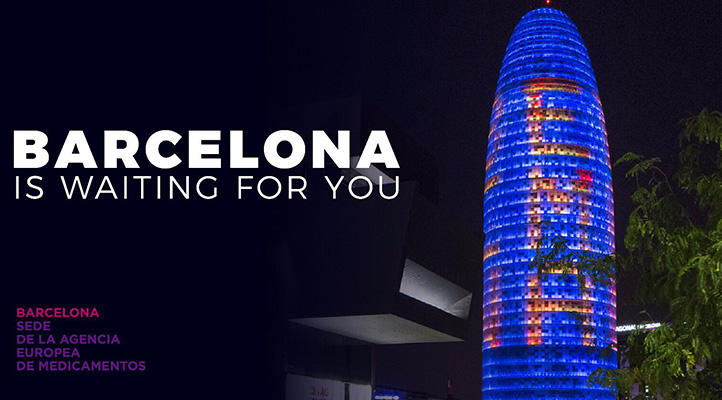
The EU –its institutions and member states– has supported the Spanish government in its dispute with the separatists of Catalonia. It has done so, among other reasons, in defence of its own interests, which do not include the breaking away of territories, far less if it involves flouting existing and recognised law. But on the rollercoaster that is the Catalan saga the EU is in an uncomfortable position. Despite this, the EU can now express solidarity with a Catalonia that is fully integrated into Spain and Europe. It has an opportunity on 20 November when the European Council chooses the city to host the European Medicines Agency (EMA), which is leaving London in the wake of the Brexit vote: Barcelona has put forward one of the strongest candidacies, although it is overshadowed by the independence issue.
Showing solidarity, with and for Spain and Catalonia, does not mean overlooking other candidates that also have a strong case. Nineteen cities are competing, although those with the greatest chances, in addition to Barcelona, are Amsterdam and Copenhagen, followed by Milan and Lille. Spain presented a convincing case for the Torre Glòries (formerly the Aguas de Barcelona tower) in a city that is attractive in many ways, with solid scientific and industrial grounding in pharmaceuticals and good transport links. The negotiations seemed to take place in a bubble far removed from the independence issue, with exemplary cooperation between the Spanish government, the Catalan regional government and the Barcelona city hall. But the prevailing climate counselled against a public and conspicuously showy presentation.
In the face of the separatist challenge, and influenced by the efforts of Spanish diplomats, the EU has shown solidarity with Spain, with the Spanish state, especially as expressed by the Presidents of three institutions –the European Commission, Council and Parliament– but also in defence of its own interests. This solidarity –support for the Spanish state and government and non-recognition of the Unilateral Declaration of Independence– is something the separatists never understood or assessed. Apart from the declarations and the non-recognition on the part of its institutions and member states, the EU neither has nor wants to have the tools for getting embroiled in a crisis like this.
The EU respects its members’ internal affairs, unless (as is happening in Hungary and Poland) they breach the rule of law or democracy, as this is interpreted by the EU itself and its treaties. And the application of Article 155 is seen from this perspective of respect, even more so when Mariano Rajoy decided to call regional elections in Catalonia on the first possible date. The EU likes laws, voting and non-violence. Hence the President of the European Council, Donald Tusk, said after the Unilateral Declaration of Independence that ‘For the EU nothing changes. Spain remains our only interlocutor. I hope the Spanish government favours force of argument, not argument of force’. The images of police violence on 1 October made an impact. And the incarcerations cause unease. But in the face of illegality and an attack on territorial integrity, defence comes first, in a part of the world where Montesquieu and the separation of powers remain in force. The EU remains concerned. Berlin is calling for reconciliation.
There is of course also the question of precedents being set for other claims of this ilk, and the prospect, explicitly rejected by the President of the Commission, Jean-Claude Juncker, of an EU bedevilled by small or micro states, presumably under the complete dominion of the two giants: France, possibly, and Germany.
There is a debate, which is rather academic but also political, about whether European integration favours these rifts or prevents them. Beyond this it may be argued that with more and more powers going to Europe, the member states are being voided of content, causing the regions to seek direct dealings with Brussels. There is another side to this coin: as Alan S. Milward wrote in the 1990s, European integration has saved nation states, from downwards disintegration (the regions) and sideways disintegration (globalisation). And this is even more the case in recent times when such integration advances by the intergovernmental course, in which the member states –being a member state of the EU is almost a more important attribute than being a nation state– place themselves at the core of such construction. Jaume Ventura et al. argue that fragmentation is the outcome of globalisation and the appearance of this kind of international organisation. Years ago, the economist Robert Barro developed theories about the economic advantages of small states.
There are even certain reservations in the EU –although there is little to be done about it– regarding the excessive regionalisation among its members due to the impact it has on its own operations. Thus the sixth constitutional reform in Belgium gave even more powers to its federated entities and regions, which led to one of them paralysing the agreement between the EU and Canada for weeks.
In the case of Catalonia –and this is an important difference with Scotland and Brexit, in addition to the constitutional one– it is an economically important territory that is fully integrated into the monetary union. Unilateral independence would have involved Catalonia’s automatic departure from the EU and the monetary union, triggering a storm in the eurozone that no-one, barring the oblivious Catalan separatists, was prepared to contemplate. The impact of the saga on the Spanish economy as a whole is also a concern. The EU remains uneasy about Spain’s issue, because it is also an EU issue.


